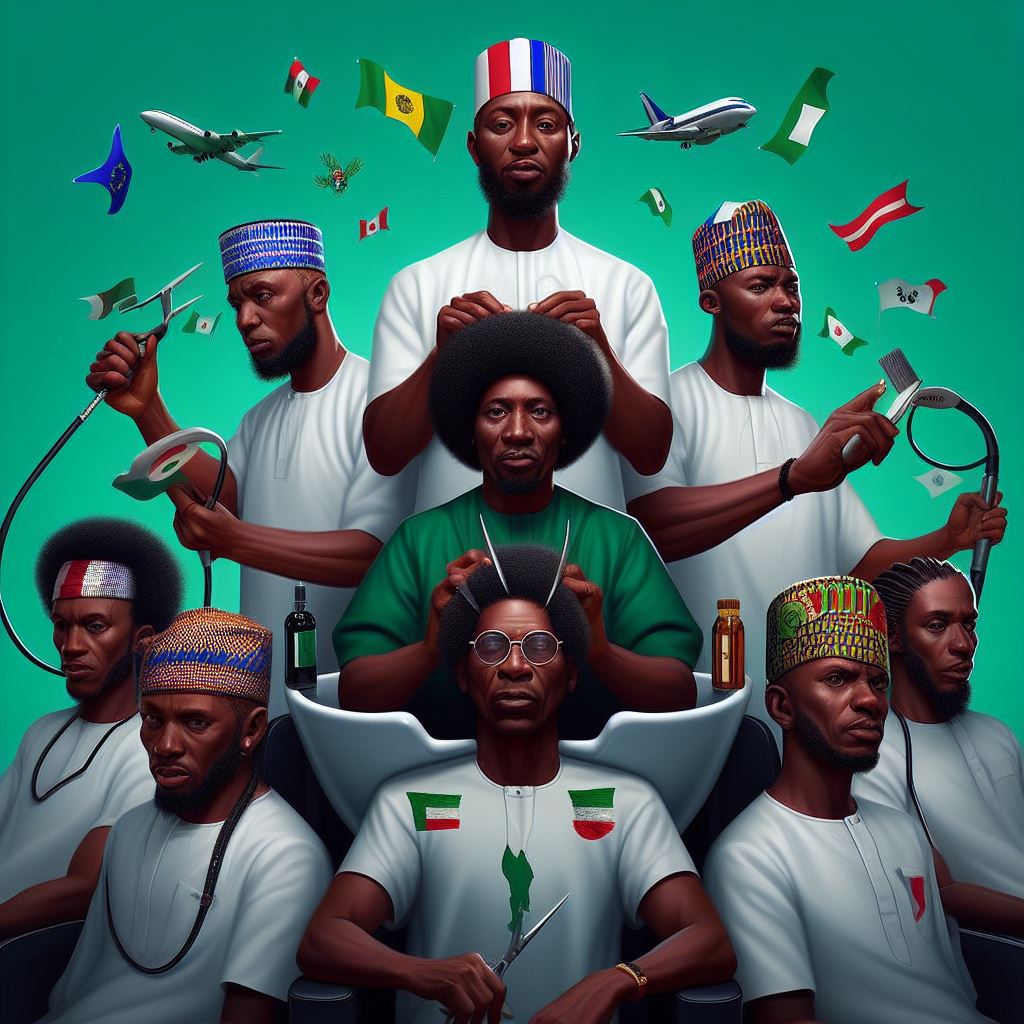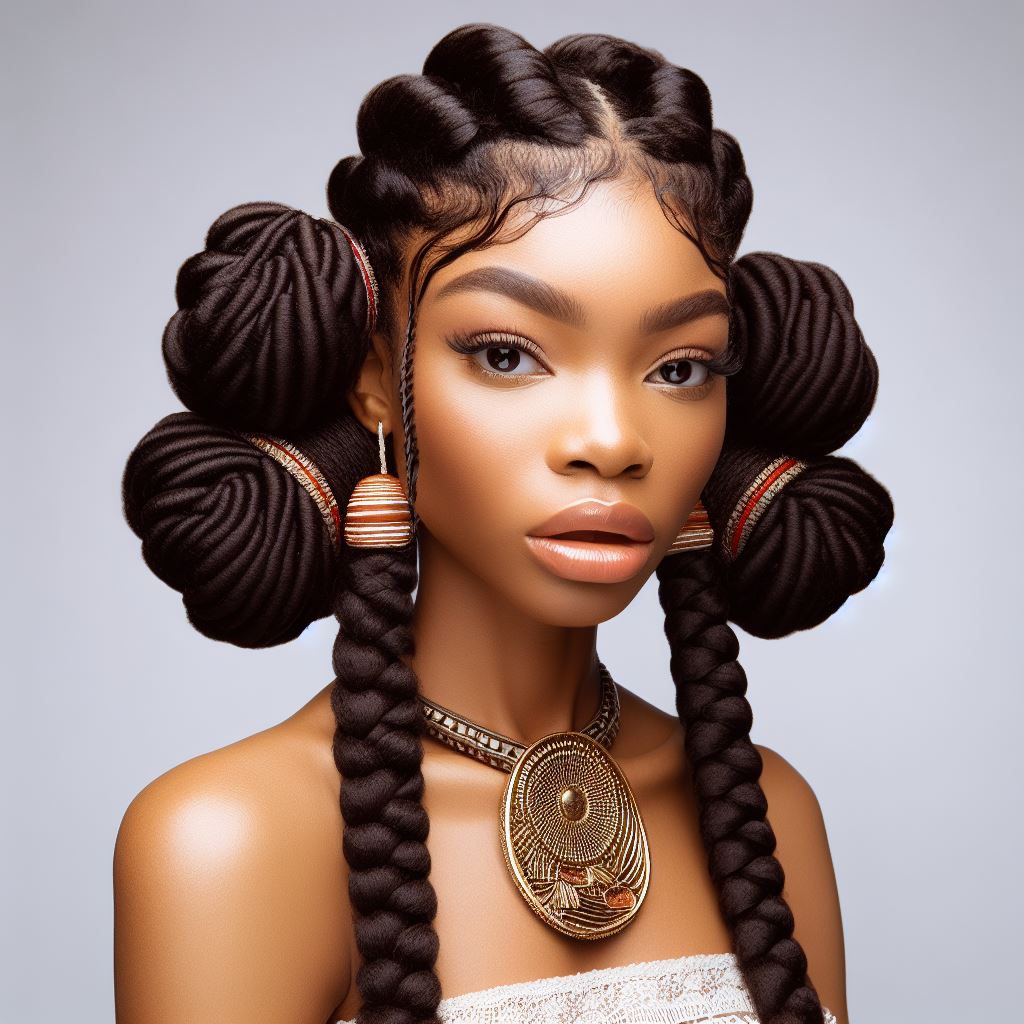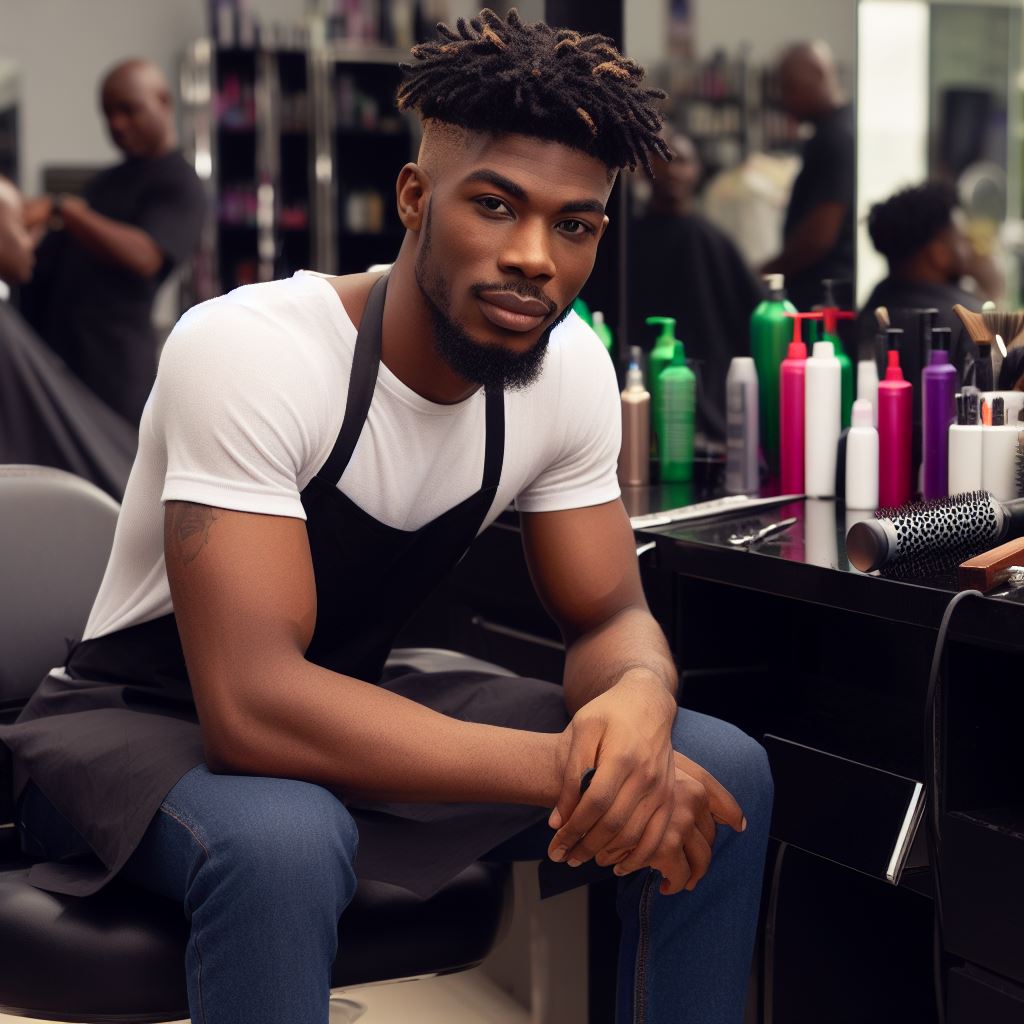Introduction
Nigeria’s hair stylist unions and associations play a crucial role in the hair styling industry, providing support and regulation.
These organizations ensure quality and professionalism within the sector, benefiting both stylists and customers.
Brief overview of Nigeria’s hair stylist unions and associations:
In Nigeria, there are several unions and associations dedicated to hair stylists.
These include the Hairdressers and Cosmetologists Association of Nigeria (HACAN), the National Association of Hairdressers and Cosmetologists (NASHCO), and the Professional Hairdressers and Cosmetologists Association (PHCA).
These organizations aim to promote skill development, provide industry standards, and safeguard the interests of hair stylists.
Importance and role of these organizations in the hair styling industry
These unions and associations are essential for the growth and development of the hair styling industry in Nigeria.
Firstly, they provide training programs and workshops to enhance the skills and knowledge of hair stylists.
By doing so, they ensure that customers receive high-quality services.
Moreover, these organizations set industry standards and guidelines that hair stylists must adhere to, ensuring professionalism and safety.
They monitor practices, equipment, and hygiene standards, thereby safeguarding the interests of both stylists and customers.
This creates trust and credibility within the industry.
Additionally, these unions and associations serve as a unified voice for hair stylists, advocating for their rights and welfare.
They negotiate with governmental bodies and stakeholders to address issues such as fair wages, work conditions, and access to benefits.
In fact, Nigeria’s hair stylist unions and associations play a vital role in the hair styling industry.
They promote skill development, establish standards, and advocate for the rights and welfare of hair stylists. By doing so, they contribute to the growth and professionalism of the industry, benefiting both stylists and customers.
Historical Background
- Nigeria has a rich history of hair styling, with various traditional methods and techniques.
- These traditions have been passed down through generations, creating a thriving hair industry in the country.
- However, due to lack of organization, stylists faced various challenges, including unfair wages and working conditions.
Origins of Hair Stylist Unions and Associations in Nigeria
- In the 1970s, hair stylists began to recognize the need for collective bargaining and protection of their rights.
- This led to the formation of the first hair stylist union, which aimed to address the issues faced by stylists.
- These unions provided a platform for stylists to come together, share their experiences, and advocate for change.
Milestones and Progression of These Organizations Over the Years
- With the formation of unions, stylists gained a stronger voice and could negotiate fair wages and improved working conditions.
- Over the years, more associations and unions were established, representing different regions and specialties within the hair industry.
- These organizations played a crucial role in standardizing training and certification processes for stylists.
- They also organized seminars, workshops, and conferences to enhance the skills and knowledge of their members.
Additionally, hair stylist unions and associations initiated campaigns to promote the importance of professionalism in the industry.
- They emphasized the need for stylists to stay updated with the latest trends and techniques through continuous education.
- These organizations also worked towards building a positive image of the hair industry in Nigeria.
- They collaborated with government agencies and other stakeholders to create policies that protect the rights of stylists.
In recent years, these organizations have made significant progress in advocating for the rights of hair stylists.
- They have successfully lobbied for the inclusion of hair styling as a recognized profession in Nigeria.
- Many associations have also created mentoring programs to support young stylists and help them establish successful careers.
- Furthermore, these organizations have expanded their reach by utilizing digital platforms to connect with a wider audience.
In general, the historical background of hair stylist unions and associations in Nigeria showcases the evolution of the industry.
From facing challenges to establishing organized platforms, these organizations have made significant strides in protecting and promoting the rights of stylists.
Through collective bargaining and collaboration, they have improved working conditions and fostered professionalism within the hair industry.
With continued efforts, these organizations will continue to be instrumental in shaping the future of the Nigerian hair stylist community.
Read: Nigerian Hair Trends: A Stylist’s Comprehensive Guide
Main Hair Stylist Unions and Associations in Nigeria
When it comes to the hair styling industry in Nigeria, several unions and associations play crucial roles in ensuring standards, promoting professional development, and advocating for the rights of hair stylists and barbers.
Nigerian Association of Hairdressers and Cosmetologists (NAHC)
The Nigerian Association of Hairdressers and Cosmetologists (NAHC) is one of the main unions in the country.
It aims to unite and support hairdressers and cosmetologists, ensuring professional growth and excellence in the industry.
NAHC’s objectives include promoting high-quality hairdressing services, conducting training programs to enhance skills, and encouraging entrepreneurship among its members.
The association also organizes conferences, workshops, and exhibitions to stimulate industry development.
To become a member of NAHC, hairdressers and cosmetologists must meet certain criteria, including acquiring the necessary qualifications and adhering to ethical standards.
Member benefits include access to educational resources, networking opportunities, and business support.
NAHC plays a vital role in contributing to the industry and society.
The association actively participates in community development projects such as skills acquisition training for vulnerable women and youth empowerment initiatives.
However, NAHC also faces challenges in its quest to elevate the hairdressing profession.
Some of these challenges include the lack of recognition for the industry, inadequate infrastructure, and the need for regulatory frameworks to govern the sector.
NAHC continues to collaborate with relevant stakeholders and government bodies to address these issues.
National Hairdressers and Cosmetologists Association (NHCA)
The National Hairdressers and Cosmetologists Association (NHCA) is another prominent organization supporting hair stylists in Nigeria.
NHCA’s primary objective is to enhance professionalism, creativity, and business acumen within the hairdressing industry.
NHCA has achieved significant milestones since its inception.
The association has successfully organized hairdressing competitions, fashion shows, and beauty pageants, showcasing the talent and skills of its members.
Additionally, NHCA has initiated sustainable livelihood programs aimed at empowering hairdressers in disadvantaged communities.
The association provides various professional development opportunities, including training sessions, seminars, and mentorship programs.
These activities assist members in acquiring new techniques, staying updated with industry trends, and gaining business management skills.
NHCA understands the importance of cooperation among stakeholders in the industry.
The association actively collaborates with government agencies, educational institutions, and product manufacturers to improve industry standards and create valuable business opportunities for its members.
Nigerian Barbers’ Association (NBA)
The Nigerian Barbers’ Association (NBA) represents the interests of barbers in Nigeria. NBA aims to promote professionalism, standardize barbering practices, and safeguard the rights of barbers in the country.
The association is committed to establishing guidelines and regulations that ensure the provision of high-quality barbering services.
NBA conducts training programs and workshops to educate barbers on hygiene practices, safety protocols, and the use of modern tools and techniques.
Advocacy is a key focus for NBA. The association actively campaigns for better working conditions and legal protection for barbers.
NBA also engages with relevant stakeholders to address issues such as unfair competition, unlicensed barbers, and counterfeit products.
In recent years, NBA has successfully raised public awareness about the importance of patronizing licensed barbers and supporting local businesses.
The association plans to launch certification programs to further enhance the credibility and professionalism of its members.
In review, the Nigerian Association of Hairdressers and Cosmetologists (NAHC), National Hairdressers and Cosmetologists Association (NHCA), and Nigerian Barbers’ Association (NBA) play significant roles in the hair styling industry.
These unions and associations contribute to professional growth, industry development, and the overall well-being of hairstylists and barbers in Nigeria.
By uniting industry professionals, providing training and development opportunities, and advocating for their rights, these organizations continue to elevate the hair styling profession and create a supportive community for all members involved.
Read: Ethics of Hair Styling: A Nigerian Stylist’s Perspective

Impact of Hair Stylist Unions and Associations
Unions and associations play a crucial role in shaping the hair styling industry in Nigeria.
They not only enhance professional standards and skills but also promote entrepreneurship, safeguard the interests and welfare of hair stylists, and contribute to Nigeria’s economy and employment rate.
Enhancement of Professional Standards and Skills
- Unions and associations establish guidelines and standards for professional hair stylists to follow.
- They offer training programs, workshops, and seminars to improve the skills and knowledge of hairstylists.
- Professional certifications provided by these organizations validate the expertise and credibility of hair stylists.
- Regular competitions and showcases organized by unions help stylists to showcase their creativity and innovation.
Promotion of Entrepreneurship in the Hair Styling Industry
- Unions and associations provide support and guidance for aspiring hair stylists to start their own businesses.
- They offer resources and mentorship programs to help hairstylists establish and manage their salons.
- Networking opportunities provided by these organizations enable stylists to connect with potential clients and business partners.
- Unions and associations collaborate with financial institutions to facilitate access to loans and grants for salon owners.
Safeguarding the Interests and Welfare of Hair Stylists
- Unions and associations advocate for fair working conditions, reasonable wages, and proper benefits for hair stylists.
- They provide legal support and representation in case of disputes or violations against hair stylists.
- These organizations monitor salon hygiene, safety standards, and the use of quality products to protect stylists and customers.
- Unions and associations ensure that hair stylists are treated with respect and dignity in the workplace.
Contribution to Nigeria’s Economy and Employment Rate
- The hair styling industry, supported by unions and associations, contributes significantly to Nigeria’s economy.
- Salons, beauty parlors, and haircare product manufacturers generate revenue and create job opportunities.
- Increased employment rate in the industry helps to reduce unemployment and improve the living conditions of hair stylists.
- The industry also attracts tourists and foreign investment, further boosting the country’s economy.
Overall, hair stylist unions and associations have a profound impact on various aspects of the hair styling industry.
They elevate professional standards, foster entrepreneurship, protect the interests of stylists, and make significant contributions to Nigeria’s economy and employment rate.
Read: Hair Stylist Tools: Must-Haves in Nigeria’s Salons
Explore Further: Intercity Transit in Nigeria: A Bus Driver’s Perspective
Challenges and Opportunities
- One of the major challenges faced by Nigeria’s hair stylist unions and associations is addressing licensing and certification issues.
- To overcome this challenge, there is a need to establish standardized certification programs and licensing procedures.
- Another challenge is encouraging membership and participation among hairstylists in these unions and associations.
- Efforts could be made to educate hairstylists about the benefits of joining and actively participating in these organizations.
- Furthermore, the hair stylist industry must adapt to technological advancements to stay relevant and competitive.
- Hair salons and stylists can leverage technology to improve their services, such as online booking systems or digital hairstyle simulations.
- Collaboration with government and regulatory bodies is crucial for the success of Nigeria’s hair stylist unions and associations.
- By working together, they can establish industry standards, advocate for hairstylists’ rights, and provide support and resources.
Addressing Licensing and Certification Issues
- Licensing and certification issues in Nigeria’s hair stylist industry can hinder professionalism and undermine customer confidence.
- Unions and associations should collaborate with relevant government agencies to establish clear licensing requirements.
- They can develop certification programs that validate the skills and expertise of hairstylists in the industry.
- By addressing these issues, customers can trust that licensed and certified hairstylists meet certain standards.
- Regular audits and inspections can ensure compliance with licensing and certification requirements.
Encouraging Membership and Participation
- Membership in Nigeria’s hair stylist unions and associations provides numerous benefits for hairstylists.
- Efforts should be made to promote these benefits and educate hairstylists about the advantages of joining.
- Offering incentives such as access to training programs, discounts on products, or exclusive networking opportunities can encourage membership.
- Organizing industry events, workshops, and conferences can also foster participation and engagement among hairstylists.
Adaptation to Technological Advancements
- Technological advancements have revolutionized the way businesses operate, including the hair stylist industry.
- Hair stylists should embrace digital tools and platforms to streamline their services and reach a wider customer base.
- Investing in online marketing, social media presence, and e-commerce platforms can enhance visibility and attract more customers.
- Additionally, staying updated with the latest trends in hairstyling software and equipment can lead to better services and customer satisfaction.
Collaboration with Government and Regulatory Bodies
- Collaboration with government and regulatory bodies is essential to protect the interests of hairstylists and ensure industry growth.
- Unions and associations should actively engage with policymakers to influence regulations and policies that benefit the industry.
- They can provide valuable insights and expertise to shape effective regulations related to licensing, sanitation, and fair labor practices.
- Regular communication and collaboration will help foster a supportive and conducive environment for Nigeria’s hair stylist industry.
Read: Hair Styling Competitions in Nigeria: A Full Guide
Learn More: Work-Life Balance for Casino Hosts in Nigeria’s Cities
Conclusion
Nigeria’s hair stylist unions and associations play a crucial role in the development and growth of the hair styling industry.
Through their efforts, they ensure professional standards, training, and support for hair stylists in the country.
These organizations provide a platform for networking, sharing knowledge, and staying updated with the latest trends and techniques in the field of hair styling. They also advocate for the rights and welfare of hair stylists, ensuring fair working conditions.
The significance of these unions and associations cannot be overstated.
They contribute to the professionalization of the industry, improving its reputation and attracting more customers. Additionally, they help promote entrepreneurship and provide opportunities for economic empowerment for hair stylists.
Looking into the future, there is immense potential for growth in the Nigerian hair styling sector.
The country’s large population, cultural diversity, and increasing demand for diverse hairstyles create a fertile ground for the industry to flourish.
To fully leverage this potential, it is important for individuals, businesses, and the government to support and engage with these organizations.
This can be done through financial contributions, partnerships, or simply availing oneself for mentorship and knowledge sharing.
By actively supporting and engaging with Nigeria’s hair stylist unions and associations, we can contribute to the growth and success of the industry, while also empowering the talented individuals who make it thrive.




